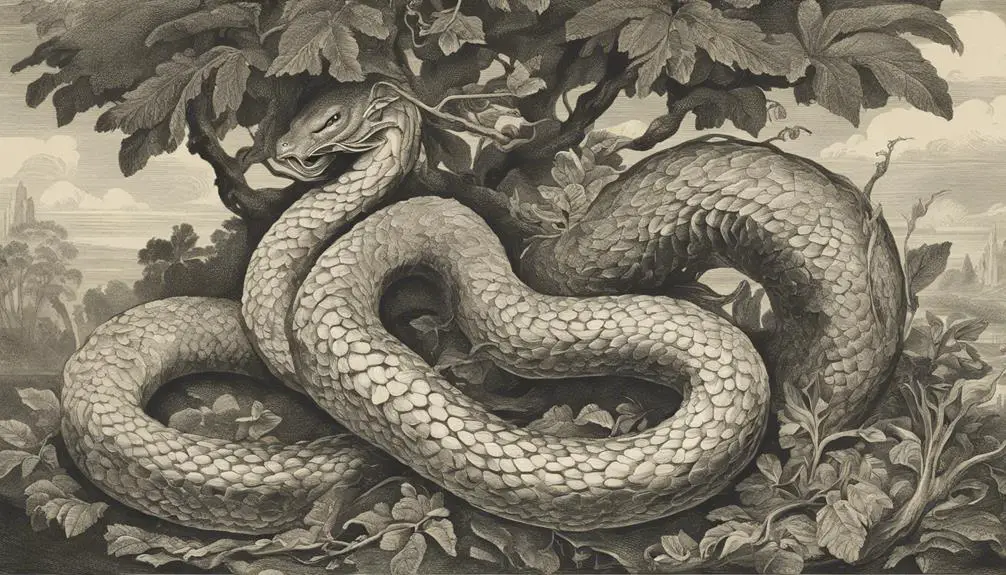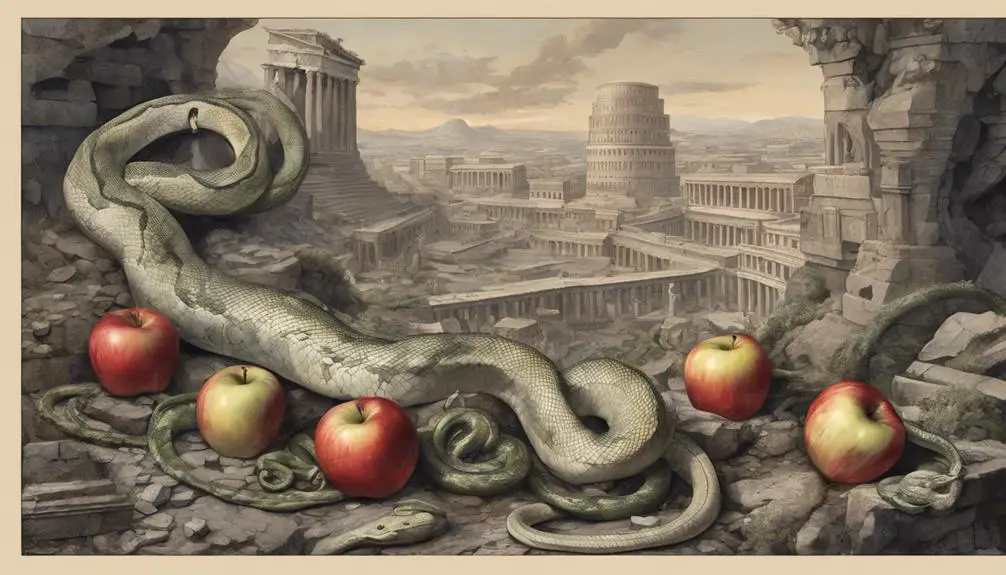Delve into the first lie in the Bible, as we unravel its enduring impact on morality, faith, and human nature.

First Lie in the Bible
Imagine you're walking through a lush, vibrant garden, symbolizing the Garden of Eden. There, you encounter a serpent, its tongue flickering as it whispers the first lie of the Bible, a falsehood that sparked a chain of events changing the course of humanity forever.
What was this lie, and how did it shape our perception of truth and deceit? Let's explore this intriguing topic, as we uncover the profound implications this first instance of deception poses for our understanding of morality, faith, and human nature.
Key Takeaways
- The first lie, told by the cunning serpent in the Garden of Eden, marked humanity's fall from divine innocence to a life of suffering.
- This deception led to Adam and Eve's disobedience, consuming the forbidden fruit, symbolizing the violation of divine command.
- The repercussions of the lie were severe, introducing sin and death into the world, straining humanity's relationship with God.
- The lie's impact is far-reaching, influencing societal norms, personal conduct, religious beliefs, and even causing wars and political unrest throughout history.
Setting the Biblical Scene

Often, to fully grasp the gravity of the first lie in the Bible, you need to vividly understand the scene in which it was set. This setting, articulated in the Creation narrative, is no less than the idyllic Garden of Eden, a place of perfect harmony, beauty, and abundance. As you delve into the Garden's description, you'll find a narrative rich in symbolism and replete with elements of divine design.
The Garden was divinely ordained and crafted as a home for the first human beings, Adam and Eve. It's a place where every need was met, where there was no pain, suffering, or death. Yet, it's not just the physical environment that's important. You should also appreciate the moral and spiritual climate of the Garden. It was a realm of innocence, purity, and unbroken communion with God.
This understanding of the Garden's description is crucial to appreciating the significance of the first lie. With this backdrop, you can see the stark contrast between the truth of God's word and the deception that was to follow. As you reflect on this scene, it becomes clear why such a lie would have catastrophic consequences.
The Serpent's Deceptive Appearance

As you further explore this biblical tableau, it's crucial to consider the role and character of the serpent, whose deceptive appearance plays a key part in the narrative. Serpent symbolism in biblical texts often denotes cunning, subtlety, and craftiness, each attribute being a crucial element of the serpent's deceptive strategies.
The serpent's beguiling facade belies a deceptive nature. Its physical appearance, not threatening or repulsive but rather intriguing and alluring, serves as a mask for its ulterior motives. This is a common strategy, to cloak malicious intent with an appealing exterior. It's a strategy that's as effective as it's insidious.
In light of this, the serpent's appearance in the narrative can be seen as the embodiment of temptation and deception. Its presence introduces a dynamic layer of complexity, setting in motion a sequence of events that dramatically alter the trajectory of the narrative. The serpent's deceptive strategies aren't just about trickery but also about manipulation and persuasion, highlighting a profound understanding of human nature and vulnerability.
The Forbidden Fruit Temptation

Delving into the heart of the narrative, you encounter the pivotal event of the forbidden fruit temptation, a masterstroke of deception that further unveils the serpent's cunning nature. This scene isn't just a simple act of disobedience; it's layered with symbolic interpretations, each offering a different perspective on the event and its participants.
The fruit itself, often depicted as an apple, serves as a symbol of knowledge and temptation. Its consumption represents the crossing of a boundary, a violation of divine command. You'll find this symbolic interpretation has a profound cultural influence, shaping views on sin, desire, and the pursuit of forbidden knowledge in various societies.
The serpent's role in this scene is also rich in symbolic interpretations. It's not merely a deceiver, but a symbol of cunning, trickery, and manipulation. Its successful temptation of Eve underlines the serpent's manipulative prowess, further establishing its character as the purveyor of the first lie.
Consequences of the First Lie

Having understood the serpent's role in the temptation scene, you must now grapple with the profound consequences that ensued from this first lie in biblical history.
The immediate fallout, or lie's aftermath, was severe and transformative. To bring this into perspective, consider the table below:
Before the Lie |
After the Lie |
|---|---|
Innocence and harmony |
Deceptive punishment |
Open communion with God |
Spiritual separation |
Freedom and bliss |
Suffering and labor |
This table encapsulates the stark contrast between the original state of humanity and the altered reality post-lie. The lie's aftermath was not merely punitive but also deceptive in nature. The deceptive punishment was dual-fold: expulsion from paradise and a life of hardship.
The severity of these consequences was a direct reflection of the magnitude of the lie. The lie, though seemingly simple, had disrupted the divine order. It not only strained the relationship between humanity and God, but it also introduced sin and death into the world. The lie had far-reaching effects, altering the course of human history forever. The next topic, 'Impact on Human History', delves deeper into this aspect.
Impact on Human History

Examining the lie's ripple effect throughout human history, you'll uncover its profound impact on societal norms, individual behaviors, and even religious ideologies. The Lie's Influence is deeply ingrained in the fabric of our existence, shaping our perspective of truth and deception.
To further illustrate the extent of this influence, consider the following:
- Societal Norms: The lie has often been used as a manipulative tool, leading to the establishment of norms based on deceit and misrepresentation. This has had significant Historical Consequences, such as wars, political unrest, and societal division.
- Individual Behaviors: On a personal level, the lie has influenced our behaviors and decision-making processes. It's not uncommon to find individuals resorting to lies to protect their interests or evade uncomfortable situations.
- Religious Ideologies: The lie in the Bible has been interpreted differently across various religious sects, influencing their ideologies and doctrines. Some view it as a test of obedience, others as the birth of human fallibility.
In essence, the first lie in the Bible has had a far-reaching and profound effect on human history, shaping our societal structures, personal conduct, and religious beliefs.
Lessons From the Deception

While the impact of the first lie in the Bible on human history is undeniably significant, it's equally essential to consider the lessons one can glean from this profound act of deception. Deception psychology, as displayed in this instance, reveals the power of manipulation, the ease of falling prey to falsehoods, and the catastrophic potential of untruths.
You must understand that truth importance is paramount. The first lie resulted in a loss of innocence, a distortion of reality, and a deep-seated consequence that still reverberates today. Thus, the lesson here is to value truth, even when it's uncomfortable or challenging.
Moreover, one must develop discernment, a quality that helps distinguish truth from falsehood. It's a reminder to question, to probe, and not to accept everything at face value. Always remember, deception is often sugar-coated, making it attractive and easy to swallow.
Lastly, the first lie teaches about consequences. Actions, be they based on truth or deception, carry repercussions. This understanding instills a sense of responsibility and accountability in your actions and decisions. Hence, the first lie, while a tragic event, can serve as a powerful lesson in discernment, truth, and consequence.
Frequently Asked Questions
What Is the Significance of the Number of Lies Told in the Bible?
You're delving into a complex topic, the significance of the number of lies in the Bible. It's not just about quantity, but the role each lie plays.
The 'Lie Interpretation' suggests lies can illustrate biblical paradoxes. They can reveal deeper truths or expose human flaws. So, don't just count the lies, analyze their purpose.
They're there for a reason, to teach us something about truth, deception, and the human condition.
Are There Any Other Instances of Deception in the Bible Besides the First Lie?
Yes, there are multiple instances of deception in the Bible beyond the initial lie.
You'll find that many of these deceptions have significant consequences, illustrating key biblical truths.
Examples include Jacob's deception of Isaac, and Delilah's deception of Samson.
Each of these lies led to dramatic events, underscoring the profound impact of dishonesty and the importance of truth in relationships and personal integrity.
How Did Other Cultures or Religions Interpret the First Lie in the Bible?
You're delving into lie interpretation differences across various cultures and religions. It's fascinating to see how distinct beliefs shape understanding.
For instance, some religions might view a biblical lie symbolically, less about deceit and more about moral lessons. Others might strictly interpret it as a literal falsehood.
This religious perspectives comparison is key to understanding how differing worldviews shape interpretations of the same text. Each belief system brings its unique lens to the analysis.
How Has the Concept of the First Lie Influenced Modern Christianity?
In modern Christianity, you'll find the concept of the first lie has greatly influenced the importance placed on biblical honesty. This lie interpretation has shaped teachings, encouraging believers to value truth and reject deception.
It's impacted Christian ethics, promoting honesty in all aspects of life. So, the first lie's ripple effect isn't just historical but continues to resonate, molding the moral fabric of Christianity today.
How Is the First Lie in the Bible Represented in Art and Literature?
Artistic depictions and literary representations often blend symbolism and metaphor in conveying complex themes. In art, you'll find subtle, even cryptic, references to deception, while literature may use allegory and character actions.
You're essentially seeing artists and writers use their tools to explore the human condition, which includes the capacity for untruth. So, while the subject mightn't be directly addressed, it's there, woven into the fabric of the work.
Conclusion
So, you've journeyed through the first deception in the Bible, from the serpent's cunning guise to the enticing forbidden fruit, and the lasting consequences of that first lie.
You've seen its profound impact on human history. Learning from this deception offers insight into the nature of truth, temptation, and choice. It underscores the importance of discerning truth in a world often shrouded in cunning deceit, reminding us to always seek wisdom and spiritual discernment.



Sign up